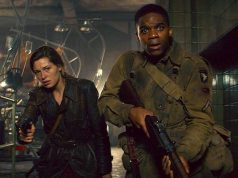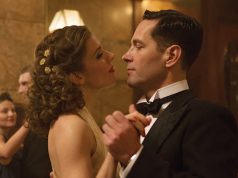If “Windtalkers” were just about the Windtalkers — the Navajo Indians whose encoded language helped America win World War II — it would be a great film. That story is noble, and not often told. It has drama inherent in it.
But director John Woo has chosen to make a movie that tells not just of the Windtalkers, but of the general horrors of war, complete with gore and dismemberment and trauma and cliches. How war freaks people out, and how terrible the thing is — that story is told all the time, and it’s being told again here. If you’ve seen “We Were Soldiers” or “Saving Private Ryan,” you’ve seen most of “Windtalkers.”
The heart of the film concerns Private Ben Yahzee (Adam Beach), a Navajo from Arizona who enlists with his friend Charlie Whitehorse (Roger Willie) to help the United States with a new plan for winning the war in the Pacific. The Japanese won’t be able to break America’s codes if they’re spoken in a language the Japanese have never heard before: Navajo.
Yahzee, Whitehorse and their tribesmen are vital, then, and Sgt. Joe Enders (Nicolas Cage) is assigned to guard Yahzee with his life, and to prevent the code from falling into Japanese hands at all costs.
A sergeant named Ox (Christian Slater) is Whitehorse’s babysitter, and much keener on the idea at first than Enders is. Enders’ reluctance is due to being bitter after watching his men die in a botched mission on the Solomon Islands. Enders himself suffered some hearing loss, but he cheated his way back into battle in a completely unnecessary sequence that involved a pretty nurse (Frances O’Connor) hitting on him. (Later, she writes him letters, and he never answers them, and I honestly don’t know why she’s even in the movie. Honestly.)
The Navajos are integrated into the ranks, where of course there is a racist soldier (Noah Emmerich) with a Southern accent who hates them, and of course one of them will eventually save his life and he’ll have to reconsider his anti-non-Caucasian stance. They head out to the island of Saipan, where before we can see the usefulness of the codetalkers — which really should be next on the film’s agenda — we first must endure a lengthy battle sequence where men yell, “We gotta get outta here!” and “Noooooooo!” a lot, and where they shoot faceless Japanese soldiers. They are all led by a Scandinavian commander played by Peter Stormare, whose accent — toned down from real life but not toned down enough — is giggle-inducing.
Eventually, we see how valuable the Navajo soldiers are, and Yahzee and Enders’ uncomfortable relationship grows into a working friendship. There is also some good, respectful treatment of Indian spiritualism — again, the film is strongest when it concentrates on aspects of the war not previously over-done in other films.
Nicolas Cage is over-the-top in his more energetic battle moments, but in the quiet moments between skirmishes, he occasionally connects. Adam Beach, meanwhile, delivers a finely tuned performance as Yahzee. He grins a lot for most of the movie, and then surprises you with some wrenching emotion in the last act. He is an actor to watch.
Strip “Windtalkers” of all its excess debris and you’ve got a 90-minute, four-star film. As it is, it’s too long and too unfocused. The trend continues: Movies have original ideas, but they get scared and retreat to familiar, heavily trod territory.
B- (; )





